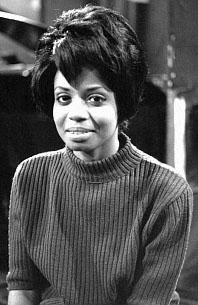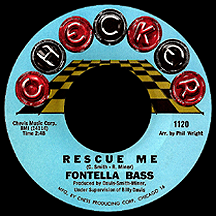FONTELLA BASS
Rescue Me
Martha Bass sang gospel music at the Baptist church she regularly attended in St. Louis, Missouri. Her mother, Navada Carter, had raised her to have a strong faith in God; exceptional vocal abilities seemed to run in the family as both spent their entire lives singing in church and anywhere else they saw fit to spread the word through music. Martha's daughter Fontella Bass (last name pronounced the same as the fish) was born in 1940 and began practicing piano as soon as she was big enough to reach the keys. At the age of five she was hired by a local mortuary to play at funeral services; she also sang with the church choir and, around the age of ten, began spending school vacation time traveling with her mother and grandmother on gospel tours, a routine that lasted for several years. It may seem unusual that one so young was so actively involved in performing gospel music, but she was, in fact, being groomed for the part by the family matriarchs. Martha insisted her daughter follow the same chosen career path as she and felt that by training her straight out of the cradle, just as her own mother had done, it would guarantee her place in God's Kingdom.
But Fontella began to feel differently as she approached her teenage years. Showing off her considerable piano skills, she won a talent contest, which resulted in offers from the owners of local night spots. Her mother, of course, forbade her to consort with the devil in such a way, but Fontella took advantage of some of those opportunites anyway...behind mom's back. By this time Martha had spent a year or so as a member of the famous Clara Ward Singers on her way to stardom as a solo gospel singer. Fontella, on the other hand, beheld the rhythm and blues stars of her mid-'50s teen years through rose-colored glasses. She made efforts to be just like them. Mother and grandmother put their efforts into discouraging her and squelching such carryings on whenever possible. Though Fontella continued playing piano in church, once she turned 18 there was nothing to stop her from giving in to her wordly inclinations.

Little Milton, an accomplished blues guitarist and singer with previous releases for Sun Records and other labels, started his own St. Louis-based record company, Bobbin, in 1958. Fontella became the pianist for his band in 1961 and her first solo single, "I Don't Hurt Anymore," featuring backup by saxophonist Oliver Sain and his band, appeared on Bobbin in early '62. A second single, "Honey Bee," with Sain's orchestra credited on the label, was her only other release. Milton was busy setting up a distribution deal with Chicago's Chess Records; thanks to the promotional power of the larger company, he hit the R&B charts with his first of many hits, "So Mean To Me," at the same time Fontella's first single for Bobbin was coming out. She performed with the Oliver Sain Revue for a couple of years, during which time she and Tina Turner recorded a single for Ike Turner's short-lived Vesuvius label. Towards the end of 1964, she and Bobby McClure (another singer with Sain's band) wound up at Chess; the company's plan was to promote Fontella as a pop-oriented R&B singer in the same mold as Jackie Ross, who'd just hit big with "Selfish One."
Bass and McClure were brought together for several duets on the company's Checker label (inspired by Motown's teaming of Marvin Gaye and Mary Wells several months earlier, a short-lived partnership due to Wells' abrupt departure from the label) before either had made any solo records. "Don't Mess Up a Good Thing" (an Oliver Sain song) was a catchy tune with nice interplay between the two; the single hit the top ten on the R&B charts and went top 40 pop in March 1965. The label followed with the equally impressive "You'll Miss Me (When I'm Gone)," but disagreements over financial and "Who should get top billing" issues caused a breakup; Sain's controlling nature where the two were concerned was also a factor. Fontella hired a singer to take McClure's place at live shows and prepared for her first solo outing with Checker Records.
She put her best foot forward with "Soul of the Man" (another Sain tune), or so she thought. The gospelesque ballad had been recorded before she joined Checker but the B side, "Rescue Me," was produced in September 1965 by Roquel "Billy" Davis (a former cohort of Berry Gordy, Jr.) and the song's writers, Carl Smith and Raynard Miner (the three had written "We're Gonna Make It," Little Milton's number one R&B hit from a few months earlier). The session was a big production with an ear-catching opening bass line, prominent brass section and undeniable vocal hook, made even more special with an unintentional mistake left in (she hummed in place of singing at the end after dropping the lyric sheet on the floor; it was one of those "magic moments" that sometimes happens by accident). It came as little surprise when disc jockeys flipped the record over and made the song a sensation in late '65, a top ten pop hit that spent most of November at number one on the R&B charts. In addition, the song impressed Grammy voters and picked up a nomination for Best Contemporary Rock and Roll Vocal Performance, Female.
Against her better judgment, follow-up singles were held to the same formula. "Recovery" was nearly indistinguishable from "Rescue Me," yet managed to reach the top 40 in January 1966. The all-too-similar "I Can't Rest," "I Surrender" and "Safe and Sound" were merely examples of repetition overriding strong arrangements and by year's end she was off the charts for good. Mother Martha was a gospel star by this time, having made a number of rousing religious recordings for Checker including "I'm So Grateful." After several attempts, Bobby McClure finally realized one solo hit, "Peak of Love," a compelling if somewhat lascivious soul explosion that went top 20 R&B in December '66.
Fontella Bass married Lester Bowie, a trumpeter previously with Little Milton's band. The two moved to Paris, performing and recording two albums with The Art Ensemble of Chicago, extremely popular among French fans taken with their avant-garde jazz performances. They returned to the U.S. in 1971 and Fontella set about reviving her career as a soul singer with the Paula record label. Unsuccessful at her attempts and unwilling to go the "oldies revival" route (she was, after all, only in her early thirties), she spent the next four decades doing what her mother - and the hand of fate, it seems - had intended all along: singing the lord's praises as a gospel singer...and, occasionally, "Rescue Me."


